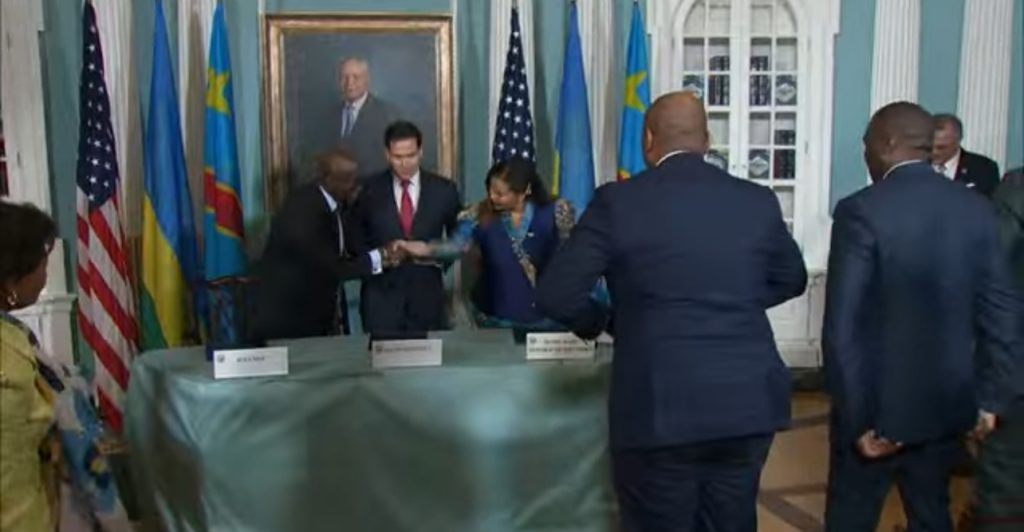Rwanda has welcomed a landmark peace agreement with the Democratic Republic of Congo (DRC) as a major diplomatic and security breakthrough, signaling a new phase in efforts to stabilize the Great Lakes region.
The accord, signed at the U.S. State Department in Washington, marks the formal end of hostilities between the two countries after years of heightened tensions, cross-border accusations, and armed conflict.
The ceremony was capped by a symbolic moment: Rwanda’s Foreign Minister Olivier J.P. Nduhungirehe and his Congolese counterpart Thérèse Kayikwamba warmly shook hands before U.S. officials—a gesture many observers described as historic, given the deep mistrust that had long characterized relations between Kigali and Kinshasa.
Speaking on behalf of the Rwandan government, Minister Nduhungirehe described the agreement as a crucial turning point.
“Rwanda stands ready to work with the DRC to deliver on our joint commitments,” he said, addressing diplomats, mediators, and observers. “This is a turning point—one grounded in truth, verification, and regional responsibility.”
Nduhungirehe expressed Rwanda’s appreciation to President Donald Trump, who is currently serving his second non-consecutive term in office, for his personal involvement in brokering the deal.
He also thanked Secretary of State Marco Rubio and Special Advisor Massad Boulos for leading the U.S. mediation efforts.
The African Union and Togo’s President Faure Gnassingbé were also acknowledged for their role in supporting African-led peace efforts.
At the core of the agreement is the establishment of a Joint Security Coordination Mechanism between Rwanda and the DRC.
Its first priority will be to implement a coordinated plan to neutralize the FDLR, a militia made up of remnants of the forces responsible for the 1994 Genocide against the Tutsi.
“FDLR is no ordinary militia. It is the remnant of the forces which committed the Genocide against the Tutsi in 1994, in which a million people were killed,” said Nduhungirehe, emphasizing that lasting peace cannot be achieved without the complete and verifiable dismantling of such forces.
Rwanda also agreed to gradually lift its defensive military posture, contingent upon a verified and irreversible end to all forms of DRC’s support to the FDLR and its affiliates.
The agreement also includes provisions for the voluntary and dignified return of refugees in both directions, in collaboration with UNHCR.
Nduhungirehe stressed that refugee return is not only a humanitarian imperative but a key condition for reconciliation and regional stability.
In addition to security and humanitarian components, the agreement paves the way for enhanced economic cooperation.
Rwanda is particularly keen on expanding partnerships with American investors and companies as part of a broader effort to transform peace into shared prosperity.
Still, Nduhungirehe cautioned that the path ahead will not be easy.
“There is no doubt that the road ahead will be challenging. Many previous agreements failed at the point of implementation. But with continued support from the United States and other partners, we believe a real turning point has been reached.”
The handshake between Nduhungirehe and Kayikwamba, following the formal signing of the agreement, drew sustained applause from those in the room.
For many, it marked more than a diplomatic protocol—it was a symbolic commitment to reconciliation and cooperation after years of division.
For Rwanda, the agreement represents both a diplomatic victory and a long-sought opportunity to restore regional trust, eliminate existential threats, and turn the page toward a future of peace, security, and economic opportunity.
